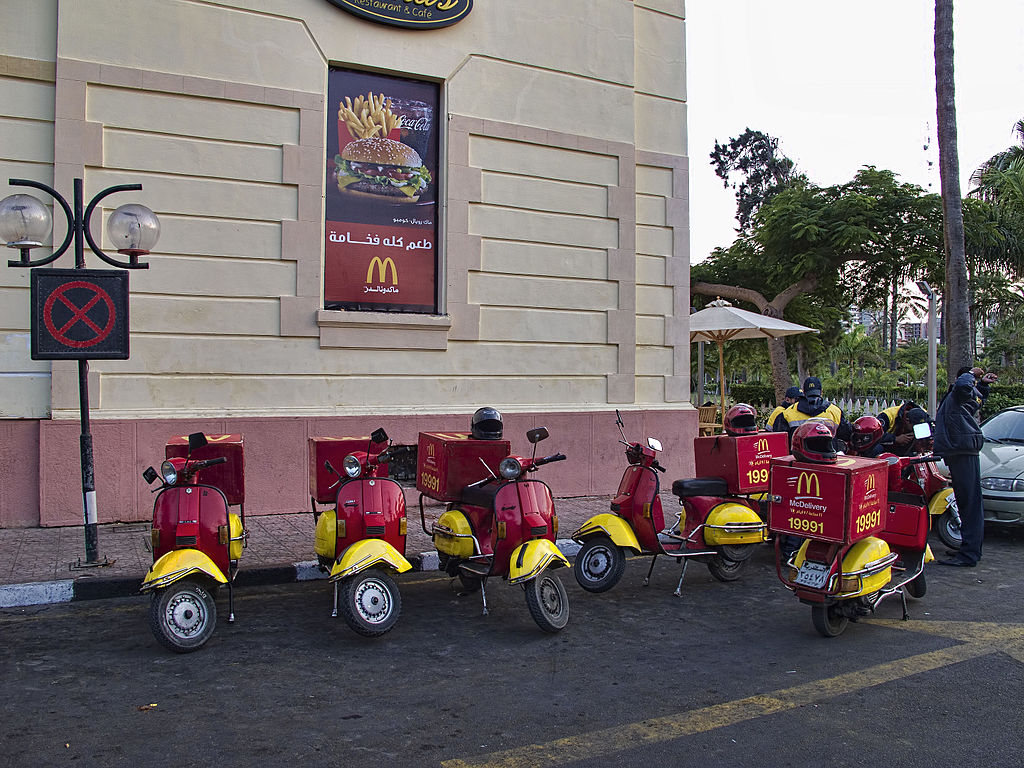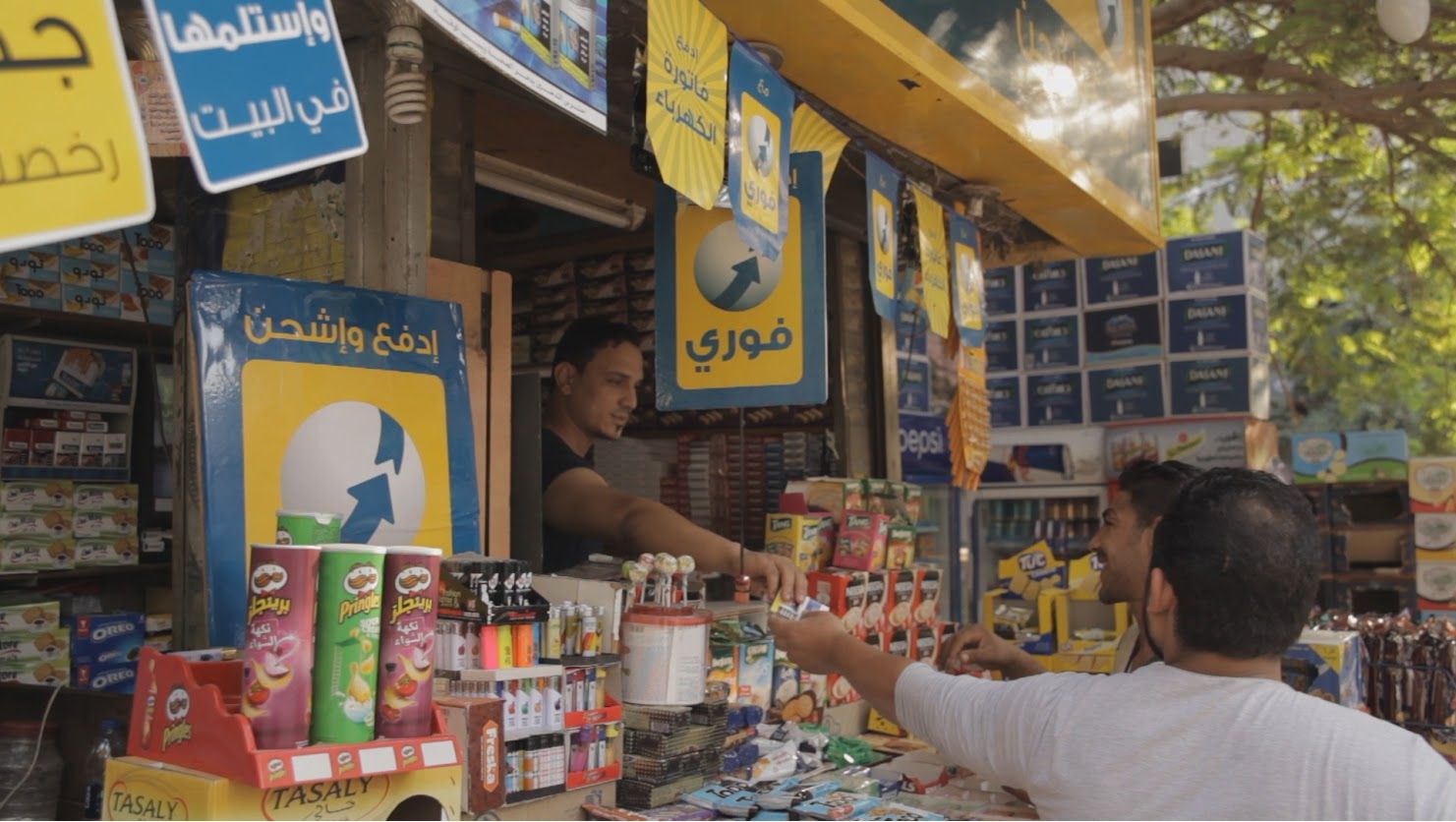
A pharmacist searches for medicine at a pharmacy in Cairo, Egypt, November 17, 2016. REUTERS/Mohamed Abd El Ghany
As the clock strikes nine over a corner of Heliopolis, cars and pedestrians alike begin to disappear from the streets one by one. The rushing noises and the voices of people hurrying home on the main street nearby slowly begin to fade and the barking of packs of stray dogs rises to a crescendo.
But as the streets darken and the curfew enforcement begins, one light burns on. A pharmacy stands open for business 24 hours a day, seven days a week.
On duty there is Mohamed Ibrahim, who works six 12-hour shifts a week from eight o’clock in the evening to 8 o’clock in the morning. He tells Egyptian Streets that he is no longer as worried about his health as he was when this all started.
“It’s going to take its course,” says Ibrahim, who observes far less foot traffic and far more home delivery orders at the pharmacy these days than before the safety measures were announced.
Across Egypt, pharmacists, doctors and nurses, sanitation workers, delivery drivers, and other essential workers are exempt from the curfew, but sentenced to long working hours at great personal risk to keep our communities afloat as we fall deeper into the crisis caused by the COVID-19 outbreak. They do not have the luxury to obey or even flout the movement restrictions imposed to slow the spread of the coronavirus.
Ibrahim’s mother and father live in Gharbia, where he is originally from, and he only visits them every once in a while and while observing precautionary measures.
“If I were still living with my family,” he says, “I wouldn’t go to work.”
But even while he is still able to earn his daily bread, Ibrahim’s line of work is heavily affected by the coronavirus pandemic. One of the most frustrating experiences to him is the false information flying about.
“People were speaking about a drug that could accelerate the recovery from the virus, but it’s only supposed to be taken under medical supervision,” he tells Egyptian Streets. “We started receiving orders for it as soon as the rumor got out, from people thinking it could help them avoid getting the virus. But then the drug became unavailable to people who actually needed it.”
To people like Ibrahim and infection control specialist Iman Mahmoud, quarantine is a privilege not afforded to their line of work. Mahmoud, who works across Cairo in the National Heart Institute, told Egyptian Streets of the psychological pressures of working in the medical sector.

Nurses and doctors still struggle despite the constant demands for their work conditions to improve.
Credit: 2013 Teun Voeten/Panos
Although medical and nursing staff at the National Heart Institute are provided with paid sick leave, personal protective equipment, and guidance on how to act should they experience symptoms linked to COVID-19, dealing with a contagious disease is a fearsome task.
“Even as an infection control specialist, my personal human response is to worry and be scared, especially when I think that I might carry something home to the people I live with,” says Mahmoud, whose working hours have increased since the crisis began.
Also exempt from the curfew are delivery workers. As food outlets were forced to close down in March, their only remaining source of income was home delivery.
Ali Ramadan, who delivers food for one of the bigger delivery services in Egypt, says that while the company provides them with gloves, masks, and basic health coverage, there is no paid sick leave for workers with symptoms.
“If I stay at home, how will my children eat?” says Ramadan.
Like many others in his position, the threat of the coronavirus seems far less tangible than the threat of financial distress. In fact, he barely registers the increased risk. He feels safer on his motorbike these days as the streets are empty.
Not only people whose jobs require them to go to work while others stay home have a front seat in observing life during the pandemic. Daily and irregular workers make up a large part of Egypt’s workforce, and Egypt’s Ministry of Manpower provided those of them who are registered in its database (300,000 of the estimated 10 million) with EGP 500 of exceptional aid. But that is likely not enough.
Hany*, the owner of a koshk, or street corner kiosk, opposite Ibrahim’s pharmacy has no option but to stay open throughout crisis and curfew. Unlike a supermarket, he says, the goods in a kiosk have to be guarded from theft at all times.
“Often when police passes by during curfew hours, you can tell they know we have to be here. They take pity on us. I know he [the officer] has to enforce the curfew, and he knows I can’t leave the kiosk,” says Hany.
A strong supporter of stringent precautionary measures, Hany is afraid of the possible consequences of handling cash touched by many people and coming into contact with people unable to self-isolate.
Despite this, his livelihood has taken a massive hit as a result of the crisis.
“I am harmed by this more than most, my family has financial commitments, I have to get my daily pay, my colleague’s daily pay, pay my rent,” he says. “Before this curfew, I used to make rent easily. But not anymore. I make almost as little as half of what I used to.”
And yet, Hany asks for responsibility from both people and government, saying that stricter measures for a shorter time are likely to allow us to return to normal soon.
“I want people to take this seriously. This virus doesn’t have a vaccine. You’re not just harming yourself,” he says. “You can’t just say ‘I’m not infected so I can have a gathering’.”
In a similar vein, both Ibrahim and Mahmoud express their concern about the flouting of the curfew and possibility of the country opening up prematurely. Relying simply on people’s awareness may not do enough to impede the spread of the virus.
While they are putting their health and the health of their loved ones on the line to provide services we need, many frontliners seem resigned to the fact that appreciation for their work is in somewhat short supply. Ramadan even goes as far as saying that he can’t expect people to appreciate him any more than usual – he is simply doing his job.
“When I come across a curfew enforcement checkpoint, some will thank me for the work I do, but others will ask me to change my working hours so I can get home before curfew,” Ibrahim tells Egyptian Streets.
“Some people appreciate us, thank us, pray for us. But others treat us like they’re taking our work for granted,” he adds.
And much like in other parts of the world, the higher possibility of exposure to the virus leads hospital workers to receive less than warm treatment from the people they encounter, as Mahmoud confirmed from her experience.
Nevertheless, as the interview with Ibrahim came to a close, his colleague Ahmed Hassan cut in as if to conclude:
“We have to work. People need us right now,” he said. “If pharmacies and hospitals didn’t work now, how would people manage their illnesses or chronic conditions. If we don’t work, people could die. It’s our work and we have to do it. Even if it’s dangerous.”
*Real name of interviewee changed at his request.
* This article was originally published here




0 Comments